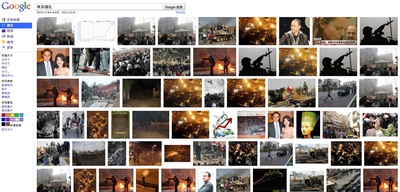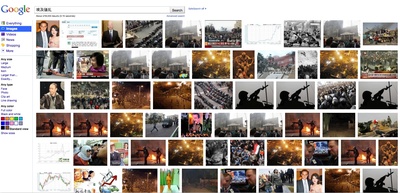
Before the ink was dry on Hosni Mubarak's resignation and Cairo's streets began to clear, every news agency worth their Google ads began to report on the impact of Egypt's protests on China. Some pundits even suggested that China might be next. The problem with such reporting is that there wasn't much to report; events in the Middle East have not prompted the average Chinese to take to the streets or to do much of anything. In fact, "foreign journalists and curious shoppers" made up the majority of the crowd at the location of a theoretical Beijing protest that did not materialize. Ever resourceful, journalists covering China focused on how the Chinese state sought to control news of the protests in the Middle East. The reasoning is a little too clever, if you cannot find the story you want in China, blame it on Chinese censorship and make the censorship the story.
The new restrictions on foreign journalists and the detention of dissidents following events in the Middle East were noteworthy, not because they stymied similar protests in China, but because they seem to have been largely unnecessary. Despite the Chinese government's paranoia, there was more than enough information to spark a fire had the kindling been there. Image searches inside and outside China produced very similar images of the protests (see below). 
 The top search result for the Chinese characters for "reason for Egyptian disturbance" (which was one of the top suggested searches if you typed in "Egypt" in Chinese) was a blog plausibly blaming the protests on slow long-term development, high inflation, high unemployment, stagnant living standards and corruption. The comments on the blog were even more inflammatory. Loosely translated they included:
The top search result for the Chinese characters for "reason for Egyptian disturbance" (which was one of the top suggested searches if you typed in "Egypt" in Chinese) was a blog plausibly blaming the protests on slow long-term development, high inflation, high unemployment, stagnant living standards and corruption. The comments on the blog were even more inflammatory. Loosely translated they included:
"Every country is the same, people's ability to endure it differs."
"That the [Chinese Communist] party commands the guns is very important."
"Egypt and China are the same, it's just that Chinese are more moderate."
"In Egypt crude law enforcement brought down the president. In China, such things are so common that no one even pays attention"
"One day China will likewise perish from its inability to control corruption."
The fact that it took at least five days for the government to take down this page when it was the top search result shows that censorship in China is pervasive but far from a complete black-out.
It is difficult to understand why anyone would have expected the ripples of unrest from the Middle East to reach China. Aside from the lack of real democracy and corruption that are unexceptional at their levels of development, China has little in common with Egypt. The same autocrat governed Egypt for three decades while China has been governed by a party that has mastered the art of non-democratic succession. Egyptian troops proved unwilling to fire on their own people. China's security forces have conspicuously, repeatedly, and recently demonstrated their willingness to use violence against protesters. Egypt was an ally of the US. China is increasingly seen as America's most important rival.
The economic contrast between Egypt and China is the starkest and undoubtedly the most important. Over the last three decades, China has experienced unprecedented economic growth and a correspondent, if not evenly distributed, rise in living standards, whereas Egypt's economy and standard of living have been comparatively stagnant. When Hosni Mubarack took control of Egypt in 1981 its real GDP per capita was approximately $719. In 1979 when China's reforms began, China's per capita GDP was only $212. In 2010, Egypt's real per capita GDP had only increased to $1,639, whereas China's was $2,802. Despite this, China's inflation remained relatively under control while Egypt's has been hitting double digits. These successes translate into how the Chinese feel about their status and their country. According to a recent Pew poll: "[n]early nine-in-ten Chinese are happy with the direction of their country (87%), feel good about the current state of their economy (91%) and are optimistic about China's economic future (87%)." Incidentally, the last time China suffered from a combination of high inflation and low growth the result was the Tiananmen incident.
China is a continent of a country and if unrest in Tibet or Xinjiang did not spark countrywide protests, it seems unlikely that the events in the Middle East could have much of an effect. One day millions of Chinese may take to the streets, more than likely in the context of a slowing economy and/or rising inflation, but don't expect the catalyst to be an external one.
